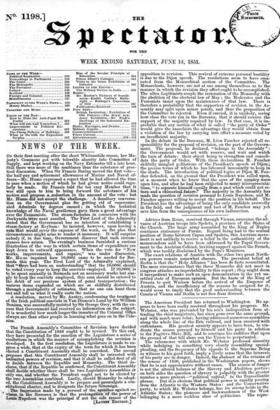The French Assembly's Committee of_ have decided that the Constitution
of 1848 ought- to b revised. To this end, -
they have presented for the sanction of the Legislature a series of-resolutions in which the manner of accomplishing the revision is developed. In the first resolution, the Legislature is made to ex- press a wish; that at the expiry, of the term for which it has been elected 'a Constituent Assembly shall be convoked.. The second t. proposes that this Constituent Assembly shall be intrusted with unlimited powers of revision, and that it shall be called first of all to decide between the Republic and Monarchy. The third de- clares, that if the Republic be confirmed, the Constituent Assembly shall decide whether there shall be two Legislative Assemblies or only one, and whether the Piesident ought not, to be elected by the two Assemblies combined. Lastly, should Monarchy be adopt- ed, the Constituent Assembly is to prepare and-promulgate a con- stitutional charter, and to designate the future Sovereign.
The impression made by a _perusal of the speeches against re- vision in the Bureaux is that the prolongation of the power of Louis Napoleon was the principal if not the 'sole reason of the [LATEST EDITION.] opposition to revision. This revival of extreme personal hostility is due to the Dijon speech. The resolutions seem to have ema- nated from the Monarchical section of the Committee. The Monarchists, however, are not at one among themselves as to the manner in which the revision they affect ought to be accomplished. The ultra Legitimists couple the restoration of the Monarchy with the abolition of the electoral law of May ; the Moderates and the Fusionists insist upon the maintenance of that law. There is therefore a probability that the supporters of revision in the As- sembly may split upon minor points, and thus the proposition of the Committee be rejected. Even if.carried, it is unlikely, seeing how close the vote ran in the Bureaux, that it should receive the support of the majority required by law. In that case, it is im- probable that any section of what is called " the party of Order " would give the anarchists the advantage they would obtain from a violation of the law by carrying into effect a measure voted by an insufficient majority.
In the debate in the Bureaux, M. Leon Faucher rejected all re- sponsibility for the proposal of revision, on the part of the Govern- ment. The proposal, he declared, "belongs to the Assembly " : the Government would act with reserve, and wait and watch the turn of debate; their object being to strengthen and consoli- date the party of Order. With these declarations M. Faucher skilfully mingled pclliations of the President's speech at Dijon the precise terms of Ivhich he has laboured incessantly to keep.in the shade. The introduction of political topics at Dijon M. Fau- cher defended, on the ground that the President was called upon-, at a moment when he knew that the eyes of the country were- upon him, and after he had been subjected to many misrepresent-a--; tions, " to separate himself equally from a past which could not re- turn and a chimerical-14nm." The majority in the Assembly his made the question of revision personal to Louis Napoleon, and M. Faucher appears willing to accept the position in his behalf. The President has the advantage of being the only candidate avowedly in the field, and the judgment and tact of M. Fancier may' yet save him from the consequences of his own indiscretion.


























